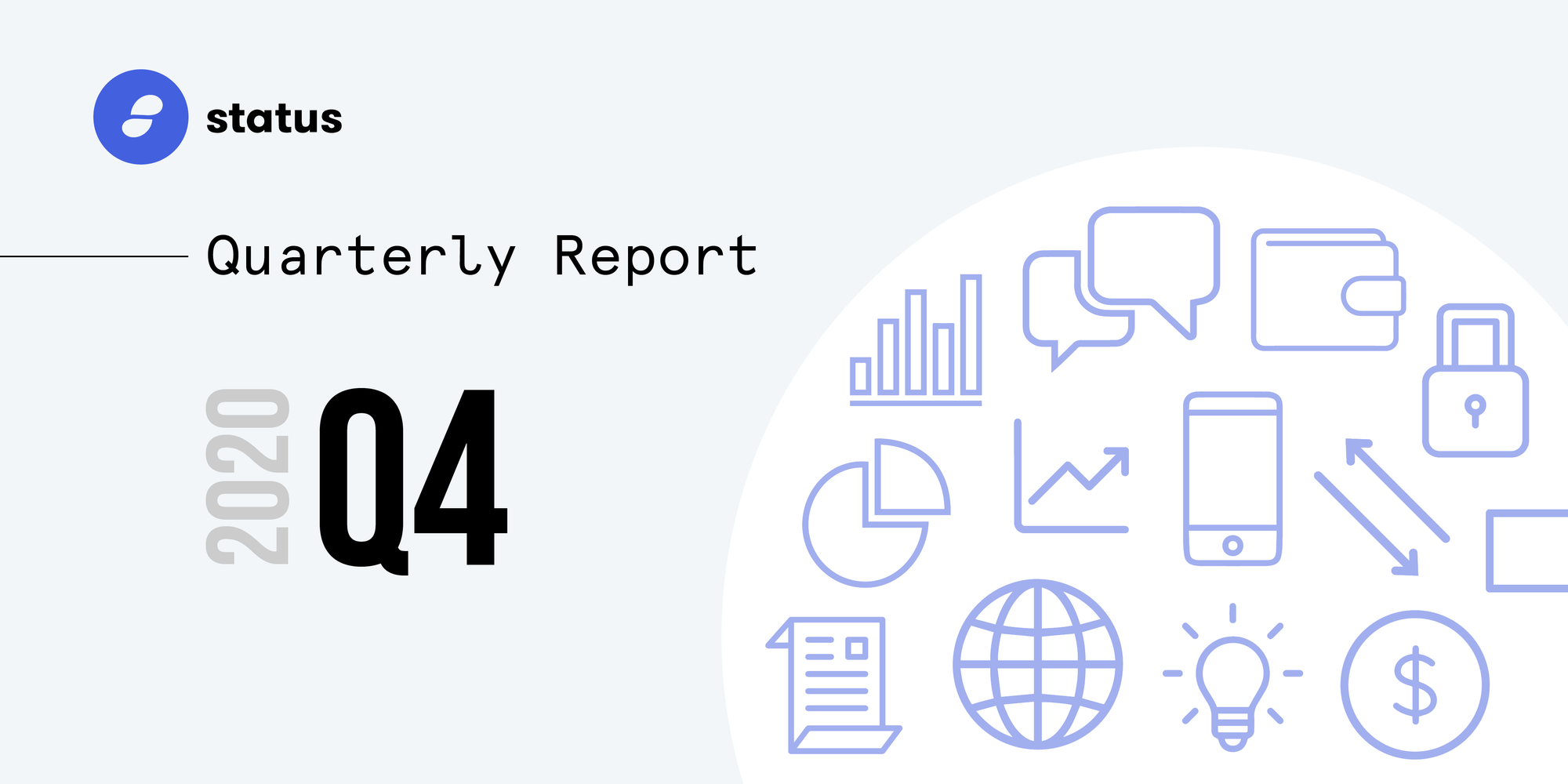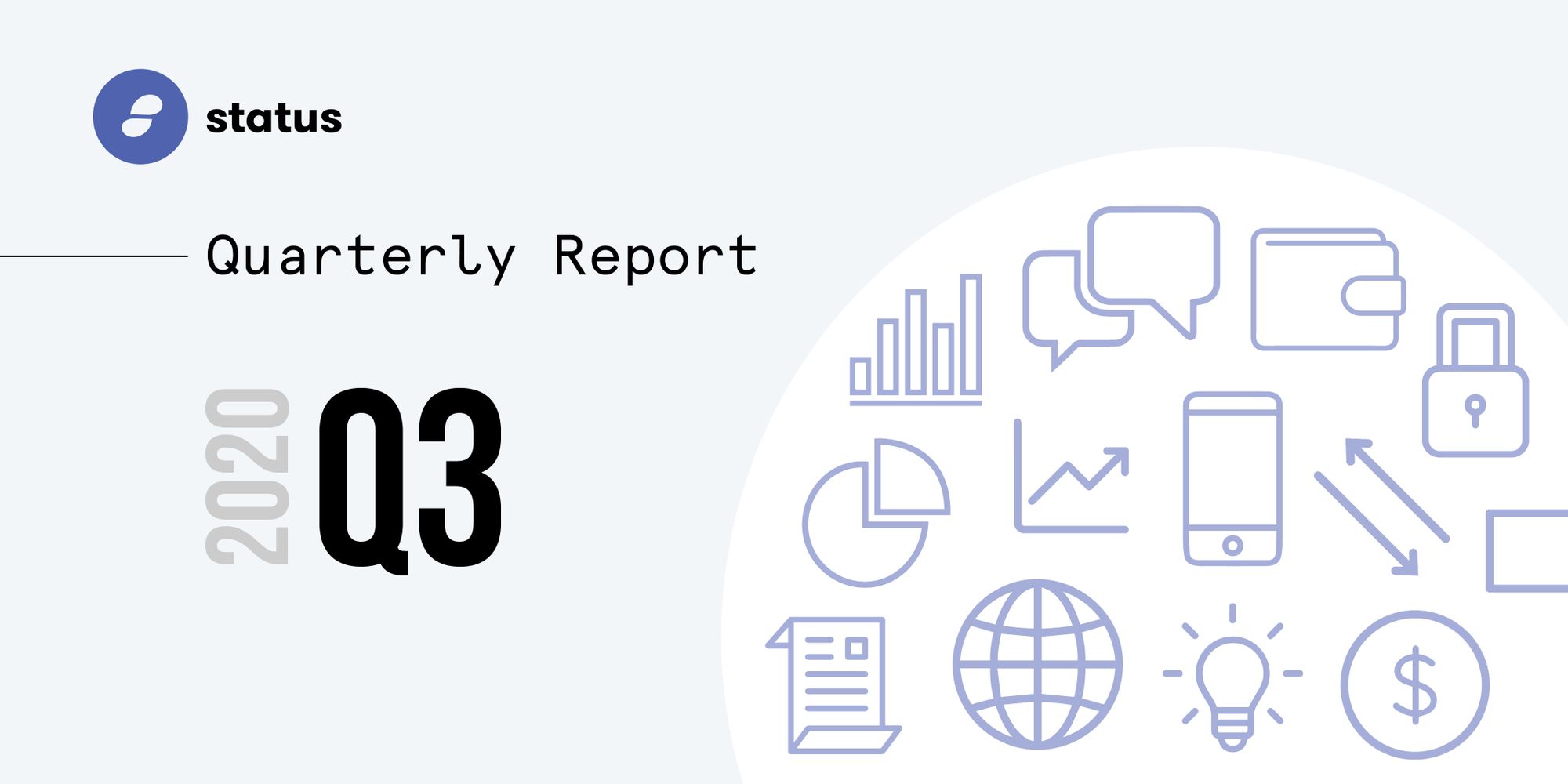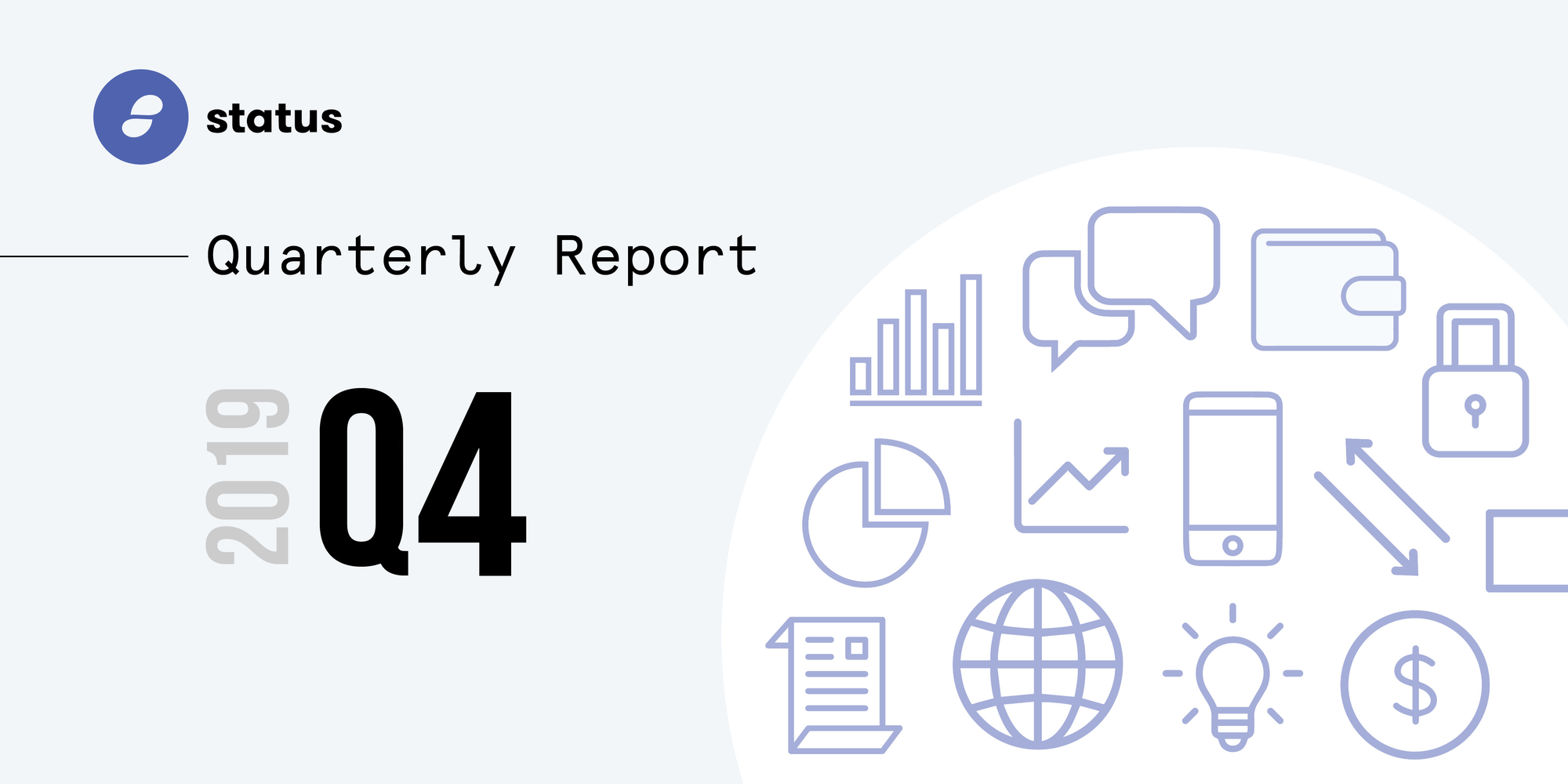The Status Network Quarterly Report - Q2 2020

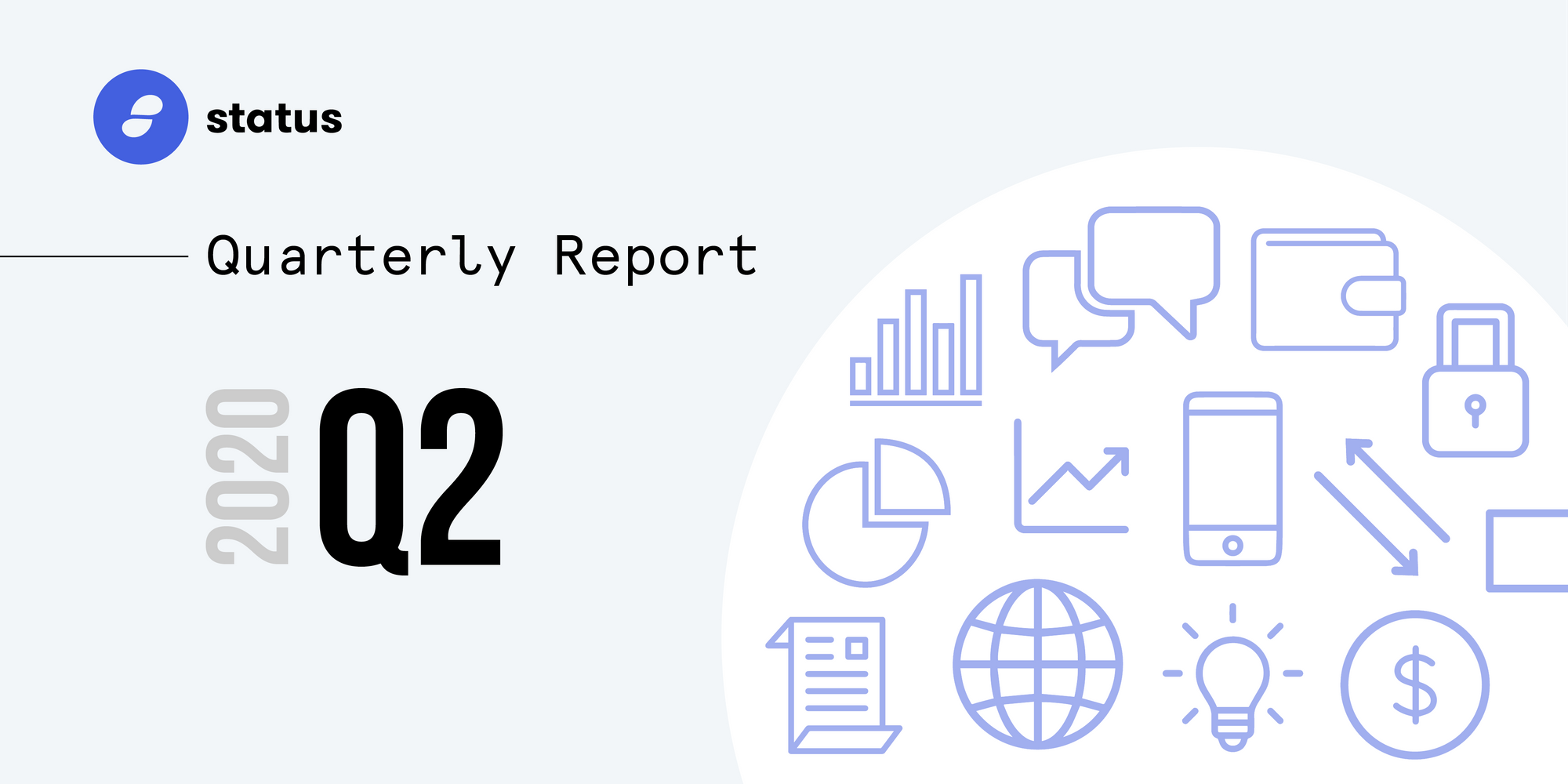
[Thanks to our wonderful community of translators, you can soon read this report in Español, Italiano, 中文, Русский, Tagalog, Bengali, Português do Brasil, and 한국어 <3 ]
We’re pleased to be back with another edition of our quarterly report. We can’t wait to share with you everything that we’ve accomplished and have been busy working on.
Why do we keep doing what we do? There is still a lot that’s wrong with entrusting communication and social networks to centralized technology. Even apps with security and privacy at their core are still subject to issues like large scale data leakages which compromise user security. We solve these kinds of problems by design, by simply not retaining sensitive data about our users that can be leaked.
Status is designed to protect your privacy with P2P protocols and end-to-end encryption. We collect no phone number, email, or bank account, so we can't and won't give out any information about our users.https://t.co/qSGlFOsfjg
— Status (@ethstatus) July 6, 2020
Decentralization is at the heart of everything we do. We’re convinced now more than ever that if an app offers transaction functionality but is centralized, this simply isn’t good enough to protect users (governments can and often do have the power to take down payment networks).
The Status App is the beginning. Independent financial capabilities, private & secure communication with no backdoors or servers to confiscate, and fundamental dapp integration. pic.twitter.com/hj6NP5XDqT
— Status (@ethstatus) May 12, 2020
All across the world, users like you and us are becoming more cognizant of the surveillance economy, understanding how our data is the product that’s being monetized and sold off.
The rise of Big Data created a massive incentive to gather information about each of us in the “surveillance economy”, an unbalanced financial incentive fueling the digital ad economy.
— Status (@ethstatus) April 2, 2020
Opt out and choose products that enable privacy by design.https://t.co/7y6PHdOYvo pic.twitter.com/QpGgDRMjzV
Q2 2020 saw the start of a new chapter for the Status Network, with the mobile app launched and our attention set to expanding and engaging the user base. This report will explore our flagship Status app, plus all the projects and initiatives currently underway within the Status Network ecosystem.
Picking up from v1.2 in Q1, in the past quarter we focused on shipping features that make your Status experience more convenient and secure.
Q2 2020 saw two new releases - v1.3 and v1.4. These brought in new highly anticipated features like:
- Private group chats 🤝
- Dark mode 🌗
- Keycard integration 🔑
- Local notifications for Android (iOS will be getting the notification upgrade soon!) 💭
We currently have 30,259 Android active devices and 3,114 iOS installations. We’ve also been doing some work on how to measure the success of features and enhancements that are shipped - something that at first appears to be straightforward to do, but becomes trickier when we consider that we don’t track user activity in the app.
You can see our user cohort dashboard work here, where we look at weekly user retention based on peer IDs.
Status v1.4 is here!
— Status (@ethstatus) June 23, 2020
Not only does it include the new integration with @Keycard_ for hardware enforced security 💳, but it also introduces highly anticipated notifications 🎉
Both notifications and Keycard are Android only for now – Learn morehttps://t.co/PiOWr84skH
Security is a critical design consideration in everything we build. @Jakubgs wrote a tutorial on how Status solved the problem of reproducible builds for Android using the NixOS package manager. Reproducible builds - also known as deterministic builds - are a way to verify the authenticity and security of products. Using the tutorial as a guide, you can use reproducible builds at any time to check the authenticity of the Status app by building the software yourself.
The coming quarter’s focus will be on making it easier and more appealing to join Status, adding more baseline features, and improving retention and out of view experience. Our upcoming releases are tentatively scoped as:
V1.5
- Image sending
- Emoji reactions
- Audio messages
- Major interface improvements throughout, introducing our Quo component framework
V1.6
- Referral program
- UI updates
We’re proud to be a transparent and open source project, You can:
We’re looking forward to hearing your ideas!
We have experimented with parallel implementations of Desktop to see how best to move forward. On the one hand, we were continuing the development of our existing `react-native-desktop-qt` version that was created in 2019 (but put on hold to focus on mobile app development). On the other hand, we also built a new implementation using `Nim-qt`.
We eventually settled on the latter, as it supports our bigger goal of Nimbus implementation into the Status app, with the whole Embark team working to push it forward.
Since then, the alpha binaries for Linux and Mac have been shipped, including an alpha 2.
Status Network Token (SNT) is the utility token that powers and incentivizes the Status Network.
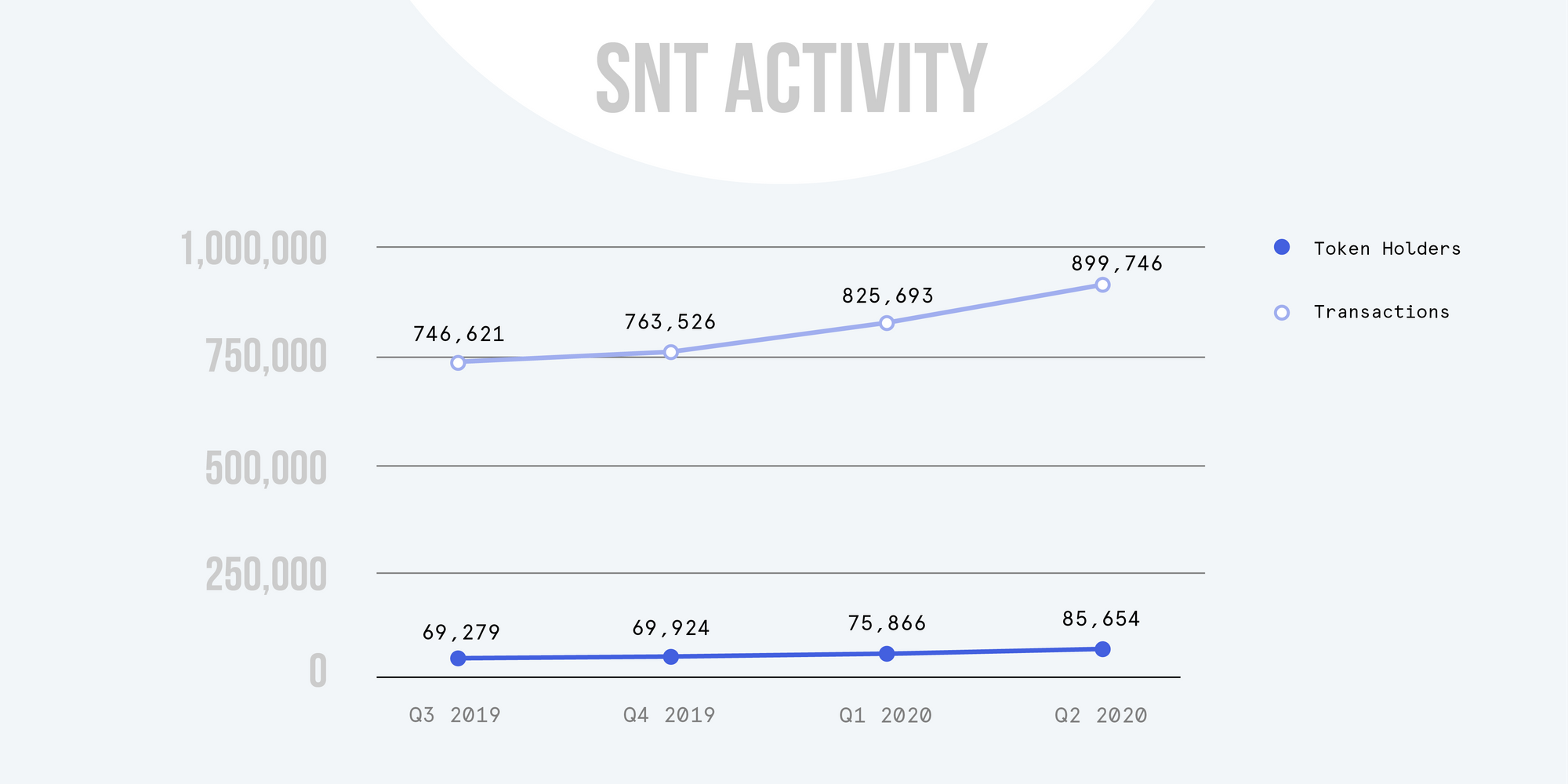
There are currently 85,654 SNT holders, with 899,746 transfers made to date, and a total supply of 6,805m SNT. You can see more token metrics here, as well as our own SNT analytics dashboard over at: https://analytics.status.im/.
Checking in on our SNT utilities live and in development, we have:
- ENS Usernames - An ENS username is a stateofus.eth handle that users can register by locking up 10 SNT, giving them a more human readable username than a contact code. There are currently 4,470 ENS usernames registered by 1,586 owners, with SNT 44,580 locked in the contract.
- Dap.ps - A curated list of DApps that relies on a unique economic mechanism to rank information without any centralized authority benefiting. Shout out to our top 3 staked DApps: Dragonereum, Zerion, and Zapper.fi.
- Teller - The source code and documentation for this project is live and available for open deployment at teller.exchange. The future of Teller is in the hands of the community.
- Sticker Market - A marketplace for artists and creators to upload and monetize their design work by selling sticker packs directly within the Status app in exchange for SNT.
- Tribute to talk - next up on deck in the near future once the immediate roadmap priorities for the mobile app have been achieved. Tribute to Talk is a spam prevention mechanism allowing individuals to monetize their time and attention by setting minimum required deposits to message them.
Keycard was formally launched in Q2, fully integrated with the Status app from versions v1.4 onwards 🥳 - this was a huge cross-Status effort, so massive kudos to everyone involved!
Keycard is a secure, contactless, hardware wallet, which, when integrated with Status, enables users to:
- Store their private keys offline on the Keycard device
- Add hardware-enforced authorizations to all their transactions, and
- Introduce two-factor authentication to log into their Status account.
To learn more about Keycard integration with the Status app, check out the Keycard launch press release here, or get yours now here, and check out press coverage on Keycard from Coindesk and Cointelegraph.
With a successful launch in the bag, the Keycard team has now shifted its focus to StatusPay, a layer2 open and decentralized payment network where users can buy goods at points of sale with crypto using Keycard. The Keycard team has been bouncing ideas with former Incubatee LeapDAO. Design work for the network is ongoing - you can track it here. More to come in the next report!
Active work on the Embark Framework has been on pause, as the Embark team has been focused on building the Status Desktop app, as well as integrating Embark with Status, so no updates to report for this edition.
@Acolytec wrote a wonderful guide on how to use Subspace to power DAO notifications, read his blog post here.
Ethereum 2.0 has seven teams working on their own node implementations, but Nimbus’ Zahary Karadjov believes this is good for the network https://t.co/TaCoPdvEq0
— Cointelegraph (@Cointelegraph) May 26, 2020
Still on core Eth2.0, we've managed to speed-up block and attestation processing by about 10-50x (by caching hash-tree-root), and have implemented EIP2333:BLS12-381 Key Generation (important for cross-client compatibility).
On the security side, we put out an innovative RFP for our Nimbus Eth2.0 security audit - we were lucky to get some great responses and just announced our chosen vendors: ConsenSys, NCC, & Trail of Bits. We’re looking forward to working together!
Our efforts this quarter culminated in the launch of the Altona testnet, which we were extremely proud to be part of.
Happy launch day everyone! https://t.co/ZGCmrJQ8t7
— Nimbus (@ethnimbus) June 29, 2020
We have also started working on the Nimbus Beacon Chain book. The goal is to cover all you need to know in order to start validating with the Nimbus client. The book covers all the details for running a validator node on the testnet from your computer.
We've also updated our three-part guide that takes you through how to install Nimbus on your Android device (see part 1, part 2 and part 3). You should now be able to use them to connect to the testnet.
We kicked off this quarter a working group to integrate Nimbus into Status. Stimbus brings together efforts on Mobile, Desktop and Nimbus, gradually replacing `status-go`, which is something of a franken-library filled with historical baggage.
The benefits of Stimbus are:
- It gives the Status app early access to Nimbus/Waku-specific research and features, e.g. the ability to access Ethereum over web and restricted networks (think: public WiFi, phone operators)
- It allows for integration with wider Status Network features that are being developed in Nim, preparing for future bundling
- Bundling prepares for network scaling
- Bundling and network scaling remove the reliance on centralized, third party, services by introducing networked services (e.g. removing calls to Infura).
Why now?
- Messaging is a simple use-case that gently introduces the new technology
- We can slowly introduce more complex Eth1 scenarios while we build out eth1x features in Nimbus (block witnesses, faster sync etc.)
- It puts the infrastructure in place for bundling more advanced services, in a phased rollout manner
- It helps drive the prioritization of medium and long term research by identifying client integration issues and requirements
- It ensures scaling of Status communication over incentivized routing, thereby generating SNT value and network independence and stability
You can follow along on Stimbus’s progress here.
Waku is a fork of Whisper (EIP-627), optimized for better usability for resource restricted devices. Q2 saw the release of four new Waku specs (v0.5, v0.6, v1.0 and v1.1).
Waku v2 is on the horizon and coming soon, bringing a much-needed solution to known fragility and scalability issues.
Read the latest @vacp2p research update on Waku, our p2p messaging protocol.
— (@oskarth) July 1, 2020
Moving to libp2p, better routing, adaptive nodes, and more!https://t.co/wNah0lHz6S
We published three research posts during the quarter:
Want to learn about DHTs, Kademlia, discv4 & discv5? Read this brief post by @DeanEigenmann that summarizes all the basics you need to know! https://t.co/qdw3A60fBm
— vacp2p (@vacp2p) April 9, 2020
Marketing team has been on a roll this quarter, powering through campaigns and content supporting the launch of v1.3 and v1.4 of our mobile app.
Our DeFi campaign continued, spotlighting our favorite DApps that can be accessed via Status.
Q2 saw the formation of our performance marketing team, with @simonam and @alek coming onboard to drive our programmatic campaigns. We’re excited to turbocharge our marketing and reach a far bigger audience.
This quarter we also relaunched our Instagram, we’re excited to now have another channel to connect with users globally.
View this post on InstagramA post shared by Status (@status.im) on
Looking ahead, there are many more exciting projects and initiatives in the pipeline, including introducing Status to the LatAm region (partnering with influencers on the ground to spread the word about Status) and the launch of our referral program, allowing users to earn crypto by onboarding their friends into Status.
You can follow along with the Marketing team’s plans in real time here.
Security is a key principle in all that we do, we continued this quarter sharing our wisdom in the press on things like 2FA, fighting censorship with blockchain, the need for a new digital paradigm of security at the core, and offering website security tips for businesses.
“Our tools are intended to help those who are afraid to freely speak their mind out of fear of oppression and even incarceration,” @Corpetty Security Lead at Status.https://t.co/LoHDtDh4uL pic.twitter.com/9M9N1HAMih
— Status (@ethstatus) June 9, 2020
With Q1 closed out on the books, here’s a look at our project finances over the last year:
| Expenses ($1,000s) | Q2 2019 | Q3 2019 | Q4 2019 | Q1 2020 |
|---|---|---|---|---|
| Salaries, core contributor fees & individual expenses | $1,800 | $1,700 | $1,882 | $1,696 |
| Third party vendors | $200 | $300 | $620 | $550 |
| Marketing & sponsoring | $50 | $40 | $161 | $187 |
| Reserves ($1,000s) | Q2 2019 | Q3 2019 | Q4 2019 | Q1 2020 |
|---|---|---|---|---|
| Crypto (excl. SNT) & fiat holdings | $57,000 | $34,000 | $23,000 | $25,000 |
[For ease of reference, we’ve shown our financial data in this report in USD. When putting together this information, we used the following Coingecko exchange rates to convert ETH balances:
- Q2 2019, 30/6/2019, 1 ETH = ~$321
- Q3 2019, 30/9/2019, 1 ETH = ~$180
- Q4 2019, 31/12/2019, 1 ETH = ~$129
- Q1 2020, 31/3/2020, 1 ETH = ~$133.]
In spite of sluggish economic activity globally, we’ve managed to continuously secure half a year of rolling fiat runway and maintain our asset diversification strategy. Project operations have been funded from our existing treasury (composed of fiat, ETH and BTC). Fundraising is planned for later in the year.
From the outset of the project, 29% of the total supply of SNT was set aside for future development. This SNT reserve remains untouched, and we have no plans currently to do anything with those SNT. We’ll keep the community informed as plans materialize.
Not many in-person events this quarter, for obvious reasons. We had mostly some virtual events on our calendar in Q2:
👀 BONUS VIDEO EPISODE 👀
— Epicenter – The Best Tech Podcast in Crypto (@epicenterbtc) May 20, 2020
They are a secure messaging app, crypto wallet, and Web3 browser built with state of the art technology. We chatted with @DeanEigenmann and @Corpetty, Engineers at @ethstatus, about the value they're bringing to the crypto spacehttps://t.co/gYekY4K784 pic.twitter.com/QHunT6SBGK
- By now, you’ve probably heard of our Principles - the values that act as our project’s guiding source of truth. We held a seminar with our Ambassadors to talk about how these values guide everything we do
- We sponsored a prize in the Gitcoin #protectprivacy hackathon, looking for a proof of concept of integration of Keycard with another app.
#ProtectPrivacy 🔐 Hackathon
— Gitcoin (@gitcoin) June 18, 2020
[1,000 DAI] - Proof of Concept for Integration of Keycard Within Mobile or Desktop Apps via @ethstatus
👉 https://t.co/kCzY2FIb4S pic.twitter.com/66ubxXEQI2
Core contributors typically get together once a year in the Fall for an Offsite to plan for the coming year. However, with travel restrictions still in place and the risk to our people’s health being too high, we’ve indefinitely postponed plans for 2020’s Offsite.
The world may be returning to some semblance of normality, with people returning to offices all over the globe. We remain, and have always been, fully remote.
We’re excited to see more companies implement remote working in their “new normal” and will continue to be advocates for this way of working which has clear inclusion, environmental, and work/life balance benefits.
Our headcount has remained relatively flat since 2019. We’re currently at 66 people, including core contributors and, now included in our headcount tracking, part time community contractors.
Looking ahead at our hiring plans in Q3 2020, we’re predominantly adding the following to our team:
- Vac - we’re looking for a protocol engineer in the field of secure messaging
- Nimbus - a tech writer to lead documentation for the team
- Legal Counsel - to guide us on the legal implications of the technology.
- Finance - new finance manager
- Marketing - community lead and social media marketing manager.
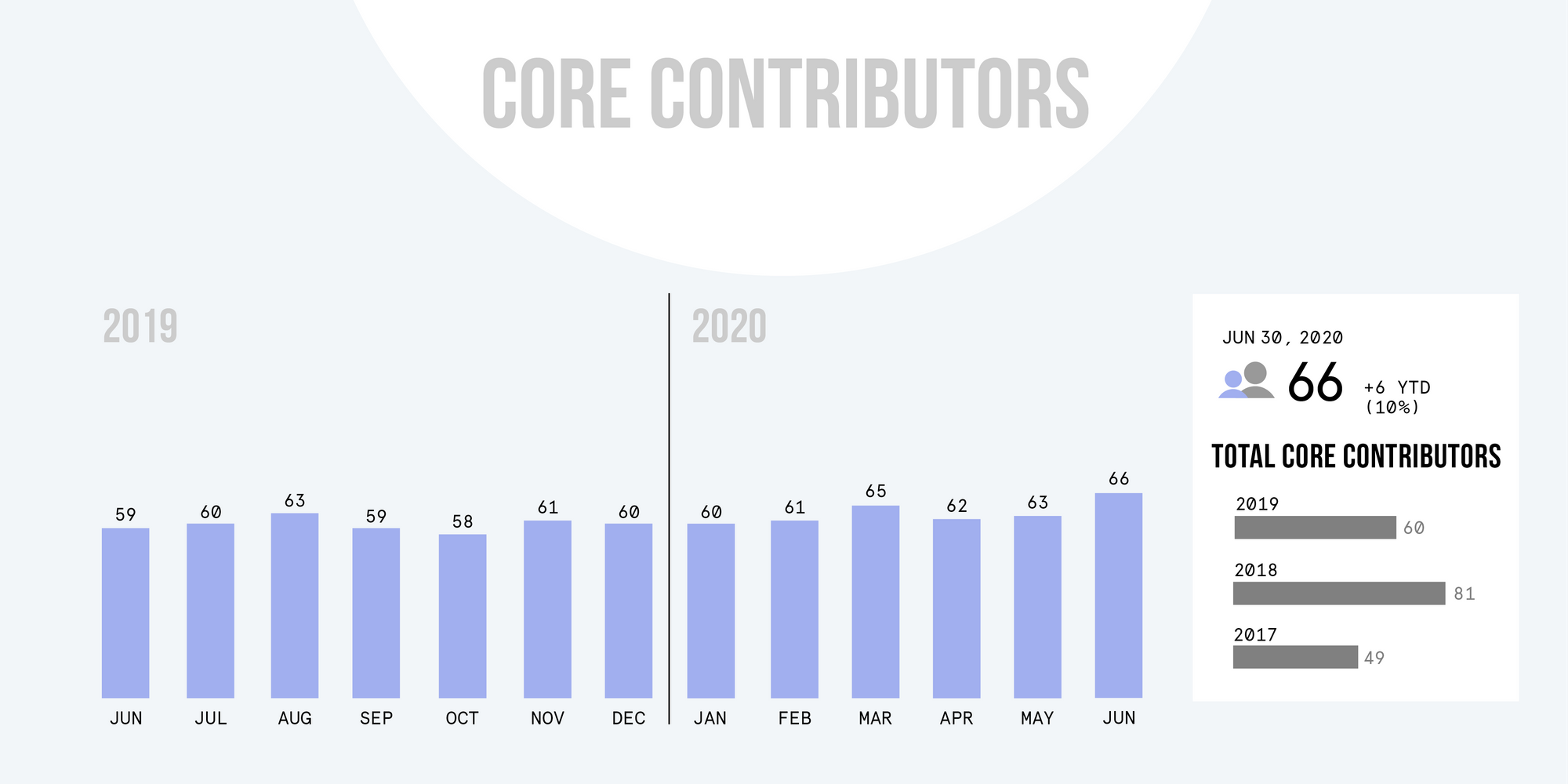
Turnover has been relatively flat in the last couple of months, having had some departures at the top of the quarter in April:
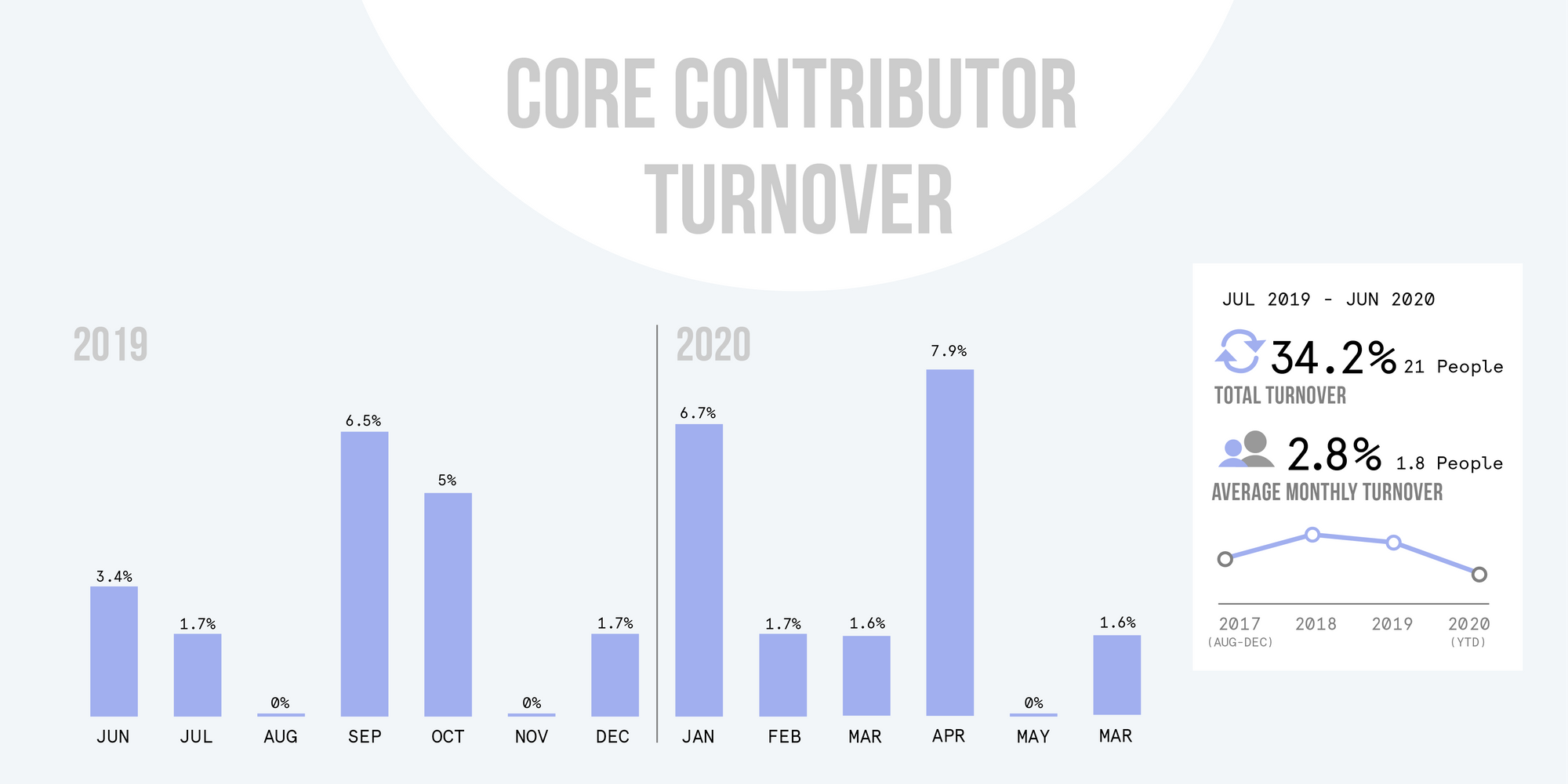
During Q2, we said goodbye to four core contributors (@mcbain, @adam, @rachel & @tina). We welcomed the following awesome new core contributors to Status:
- @samyoul - joining core mobile team as a developer
- @terry - our new People coordinator
- @alek - joining forces with Simon on performance marketing magic
- @rajeev - reinforcing our security team, and bringing technical insight to our marketing initiatives
- @eerlo - leading go to market projects enabling Status to connect with users in Brazil
- @alan - leading the charge in Argentina
- @john - dev + design alchemist to build out our design architecture on the mobile app.
In Q2 2020, we had 11 new ambassadors joining the Ambassador Program. The current number of active ambassadors is now at 41, with representation across 21 countries - spreading out to more corners of the globe. We accept applications on a rolling basis, and received 58 applications from candidate ambassadors in Q2 alone.
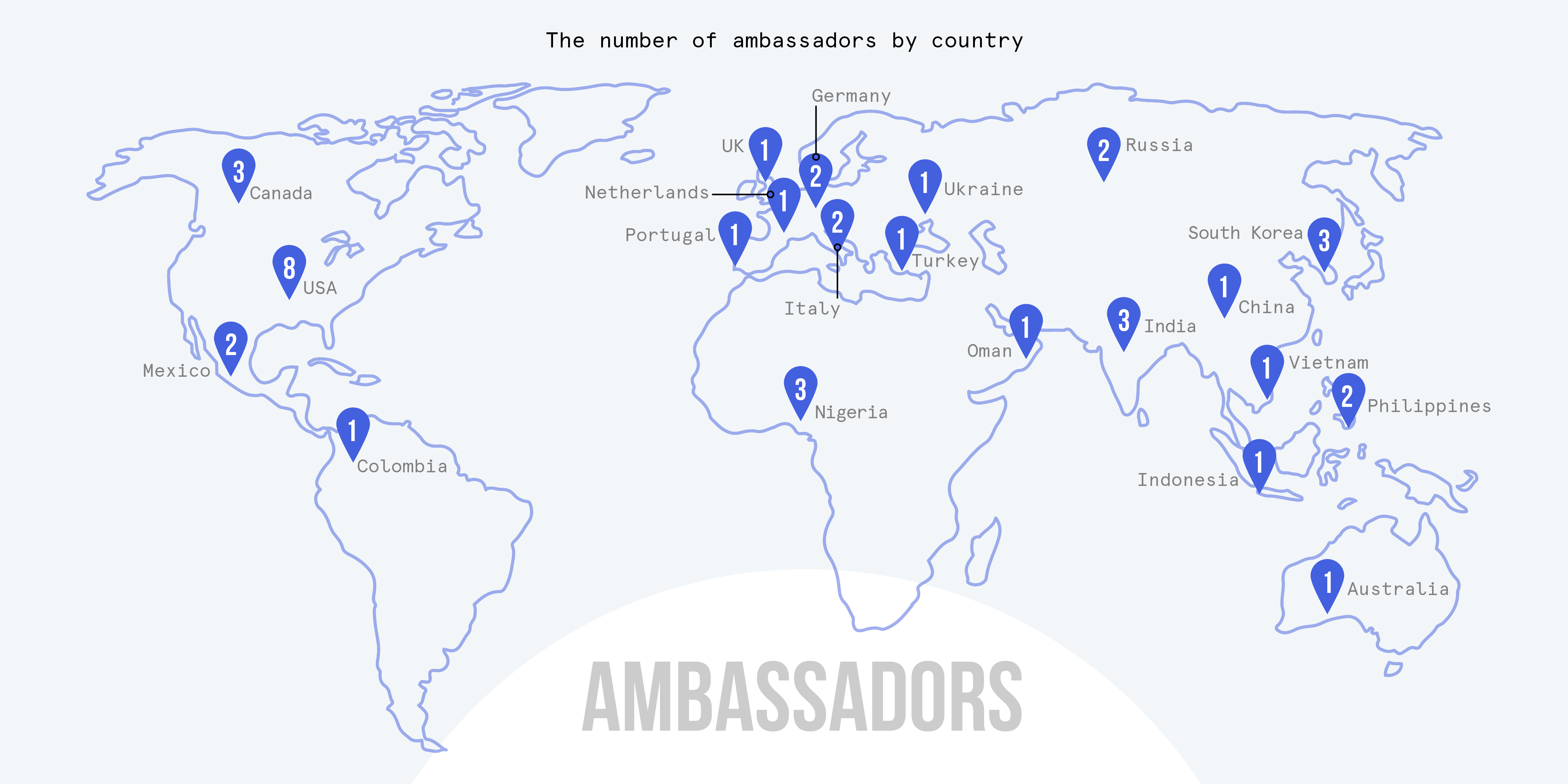
Ambassadors completed 82 tasks in Q2 2020, broken down by category into: events (2), content (68), community building (5), and technical (7) 🎉
Here you can see the development of the ambassador program since it returned from a hiatus in Q4 2019:
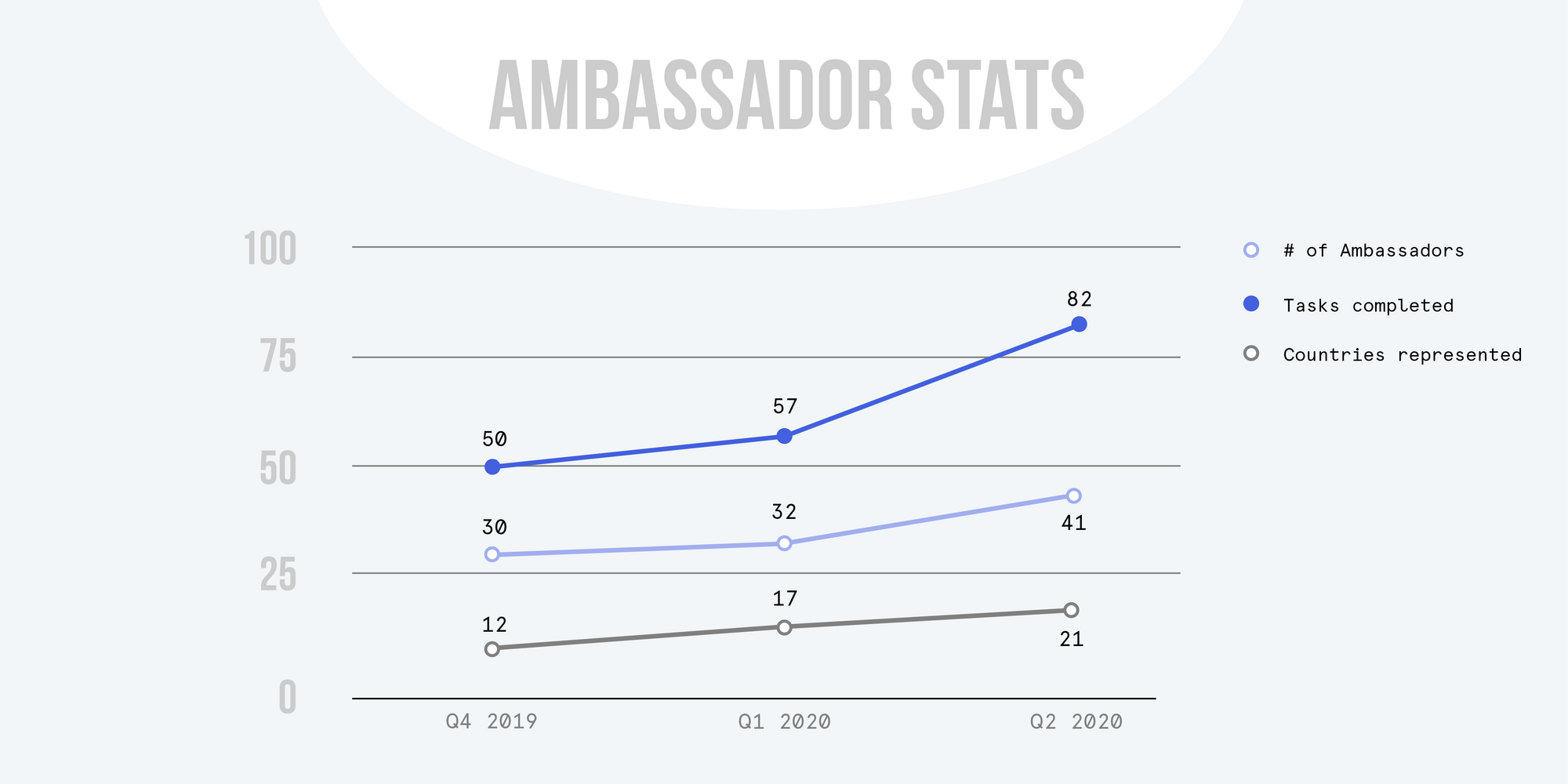
Some highlights from the program in Q2 2020:
- @Chris2pher helped draft a video script for the third explainer video on SNT utility, published a blog post about Status to Publish0x, and transcribed a Keycard Q&A interview
- @Poor Majestic Icelandgull helped draft a video script, Youtube title and description of this explainer video made by @MotionFactory
Q3’s focus for the ambassador program will be:
- 1Build our ambassador base in Latin America: this is a region where we’re seen blockchain technology really take off, so we’re keen to better place ourselves to connect with users there via our ambassadors.
- 2Improve the incentive system: watch this space, we’re building out a rewards table to make incentives for completing ambassador tasks transparent and user-friendly.
- 3Focusing on online events: it will be a while until in person events resume fully, so we’re excited about the possibilities of webinars and virtual events to continue spreading the message in the meantime.

Thanks to our community of ambassadors and contributors, the Status mobile app has now been translated into multiple languages. If you’d like to learn more and get involved, head over to translate.status.im.
| Supported Languages | Progress |
|---|---|
| Chinese (Simplified) | 100% |
| Chinese (Traditional) | 99% |
| Korean | 100% |
| Spanish | 99% |
| French | 96% |
| Italian | 99% |
| Indonesian | 99% |
| Filipino | 99% |
| Arabic | 94% |
| Russian | 96% |
| Brazilian Portuguese | 99% |
| German | 99% |
| Turkish | 99% |
Shout out to our translation heroes: Nicolas, Luis, Erol, Floyd, Albed, Alexia, Oleksandr, Andrii, Paulo, Peter, Nasib, Kuanghen Tao, & Tbenr 👏
It’s been a whirlwind first half of the year, and we’re looking forward to more decentralized goodness in the second.
As Status matures as a project and ecosystem, our strategy in 2020 will continue to be twofold:
- 1Focusing on user growth and retention by making an engaging, sticky, and compelling in-app experience in Status, and
- 2Putting in place foundational work on our next generation p2p infrastructure, allowing Status and many other projects in the ecosystem to scale robustly.
Thanks for reading this report, we’re always excited to tell you about the work we do. Here’s hoping that wherever you might be, you’re safe and well. Take care! - your friends at Status.
A huge and heartfelt thank you to those who helped translate this report, we’re super grateful for your contribution:
- Spanish: Nicolás | @enevve
- Portguese: CoinWallet5 | @CoinWallet5
- Chinese: Steven | @steven20110906
- Korean: Jinho | @jinhojang6
- Tagalog: Ken | @kenberey
- Italian: Enrico Del Fante | @tbenr
- Russian: Sergey Makeev (Editor: Anna Lutsa)
- Bengali: Asif
This report was made for your entertainment, and we’d ask you not to rely on it for any other purposes, e.g. making investment decisions. Just to be super transparent, we want to highlight that:
- Token metrics info is an estimate supplied by a third party, given for illustrative purposes. We have not independently verified or fact checked this data.
- Status financial information provided is estimated based on data available in July 2020 and may change due to intercompany chargings or ongoing updates in accounting. Numbers have been rounded for ease of presentation.
Thanks for your understanding!
